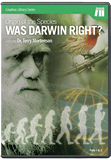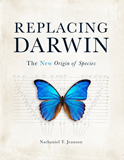
The Theological and Geological Influences on Darwin
Charles Darwin’s anti-biblical, naturalistic worldview assumptions controlled his interpretations of what he saw in the world
Editor’s note: Tomorrow is Darwin Day, when evolutionists worldwide commemorate the birthday of the popularizer of evolution, Charles Darwin, born in 1809. This article is slightly adapted from an essay by Dr. Terry Mortenson of Answers in Genesis that appears in the new book, Galápagos Islands: A Different View.1 While many evolutionists pause today in remembrance of Darwin’s birth 205 years ago and acknowledge his massive influence on the world, scant attention will be paid today to the nineteenth century ideas that influenced Darwin and his world-altering writings.
Though Charles Darwin never knew his paternal grandfather, Erasmus Darwin (he died before Charles was born), Erasmus’ theologically liberal and evolutionary ideas expressed in his two-volume Zoönomia (1794–96) significantly influenced him, so much so that Charles used the same title for his notebook of ideas about evolution that he started writing in 1837.2 Charles’ father, Robert, was even more of an unbeliever, bordering on atheism,3 and his mother was a Unitarian who had Charles educated for seven years at a Unitarian school.4
While Darwin was a medical student at Edinburgh University (1825–27), he was mentored by Robert Edmond Grant, a rabid atheist evolutionist “committed to a radical overhaul of science and society.”5 He was also much influenced by similar evolutionist and social radicals, some of a Unitarian bent, in the Plinian Society founded by the old-earth Professor of Natural History, Robert Jameson.6
But in the end Darwin couldn’t stomach medicine, so his father insisted that he attend Cambridge in 1828 to prepare for the Anglican priesthood, which would provide Darwin with a nice living. Darwin tells us,
I asked [my father] for some time to consider, as from what little I had heard and thought on the subject I had scruples about declaring my belief in all the dogmas of the Church of England; though otherwise I liked the thought of being a country clergyman. … and as I did not then in the least doubt the strict and literal truth of every word of the Bible, I soon persuaded myself that our Creed must be fully accepted. It never struck me how illogical it was to say that I believed in what I could not understand and what is in fact unintelligible.7
Despite his claim to believe the Bible, from his family background and upbringing it is safe to say that he was certainly no orthodox Christian. His remarks about his thinking just a few years later confirm this conclusion:
Whilst on board the Beagle I was quite orthodox, and I remember being heartily laughed at by several of the officers (though themselves orthodox) for quoting the Bible as an unanswerable authority on some point of morality. I suppose it was the novelty of the argument that amused them. But I had gradually come, by this time, to see that the Old Testament from its manifestly false history of the world, with the Tower of Babel, the rainbow as a sign, etc., etc., and from its attributing to God the feelings of a revengeful tyrant, was no more to be trusted than the sacred books of the Hindus, or the beliefs of the barbarian.8
This is not surprising since while at Cambridge, just before his famous voyage on the HMS Beagle, he came under the strong influence of men in the “Cambridge Network” (CN), a group of clergy and university professors who were a conduit for liberal theology coming into England from continental Europe.9 Some of these CN men arranged for Darwin to be the naturalist on the Beagle. Another CN man was the old-earth “catastrophist” geology professor and Anglican clergyman, Adam Sedgwick, who taught Darwin a great deal about geology.
More important to Darwin’s geological thinking, however, was Charles Lyell, who as a deist (or Unitarian)10 sought to “free the science of geology from Moses.”11 Darwin informs us that on the Beagle:
I had brought with me the first volume of Lyell’s Principles of Geology, which I studied attentively; and this book was of the highest service to me in many ways. The very first place which I examined, namely St. Jago in the Cape Verde islands, showed me clearly the wonderful superiority of Lyell’s manner of treating geology, compared with that of any other author, whose works I had with me or ever afterwards read.12
Years later commenting on his own views of geology, Darwin commented, “I feel much confidence in the truth of these views, for they are in strict accordance with the general principles inculcated by Sir C. Lyell.”13 Elsewhere he remarked,
He who can read Sir Charles Lyell’s grand work on the Principles of Geology, which the future historian will recognize as having produced a revolution in natural science, yet does not admit how incomprehensibly vast have been the past periods of time, may at once close this volume.14
We can also see this influence of Lyell in Darwin’s famous journal entry during his study of the Santa Cruz river valley in Argentina, just a few stops before he reached the Galápagos Islands. He wrote:
The river, though it has so little power in transporting even inconsiderable fragments, yet in the lapse of ages might produce by its gradual erosion an effect of which it is difficult to judge the amount.15
Darwin was not the unbiased pursuer of truth that evolutionists want us to believe he was.
So, before Darwin ever landed on the Galápagos Islands, he had already rejected the truth about origins revealed in the Word of God, and as a disciple of Lyell was well prepared to apply the uniformitarian principles of slow, gradual geological change over millions of years to the question of biological origins. He was not the unbiased pursuer of truth that evolutionists want us to believe he was. Rather, his anti-biblical, naturalistic worldview assumptions controlled his interpretations of what he saw in the world.
Editor’s note: Interestingly, AiG has become aware that this weekend as Dr. Mortenson, author of the essay above, will be speaking in Lynchburg, Virginia, theologian and author of The Evolution of Adam, Dr. Peter Enns will be across town and addressing “Evolution Weekend” events, including at a Baptist church.
Footnotes
- Edited by Georgia Purdom (Green Forest, AR: Master Books, 2013), pp. 46–48.
- Adrian Desmond and James Moore, Darwin (London: Michael Joseph, 1991), p. 229.
- Ian Taylor, In the Minds of Men: Darwin and the New World Order (Foley, MN: TFE Publishing, 2008), pp. 113–114.
- Desmond and Moore, Darwin (London: Michael Joseph, 1991), pp. 12–13.
- Ibid, p. 34. In Darwin’s autobiography, he says that he didn’t embrace Grant’s and his grandfather’s evolutionary ideas at the time, but then added, “Nevertheless it is probable that the hearing rather early in life such views maintained and praised may have favoured my upholding them under a different form in my Origin of Species.” See Nora Barlow, ed., The Autobiography of Charles Darwin, 1809–1882 (New York: W.W. Norton, 1958), p. 49.
- Desmond and Moore, Darwin, pp. 31–32.
- Barlow, Autobiography of Charles Darwin, pp. 56–57.
- Ibid, p. 85.
- Terry Mortenson, The Great Turning Point: the Church’s Catastrophic Mistake on Geology—Before Darwin (Green Forrest, AR: Master Books, 2004), pp. 37–38, and Walter F. Cannon, “Scientists and Broad Churchmen: an early Victorian Intellectual Network,” Journal of British Studies, Vol. IV, No. 1 (Nov. 1964), pp. 82–83.
- John Hedley Brooke, Science and Religion: Some Historical Perspectives (Cambridge, UK: Cambridge Univ. Press, 1991), p. 251.
- Charles Lyell, quoted in Katherine Lyell, Life, Letters and Journals of Sir Charles Lyell, Bart. (London: John Murray, 1881), vol. 1, p. 268.
- Barlow, Autobiography of Charles Darwin, p. 77.
- Charles Darwin, The Origin of Species (London: Penguin Books, 1985 reprint of 1859 first ed.), p. 301.
- Ibid, p. 293.
- Charles R. Darwin, Journal of researches into the natural history … during the voyage of H.M.S. Beagle… (London: John Murray, 1845), p. 181 (journal entry for 26 April 1834).
Recommended Resources

Answers in Genesis is an apologetics ministry, dedicated to helping Christians defend their faith and proclaim the good news of Jesus Christ.
- Customer Service 800.778.3390
- © 2024 Answers in Genesis







